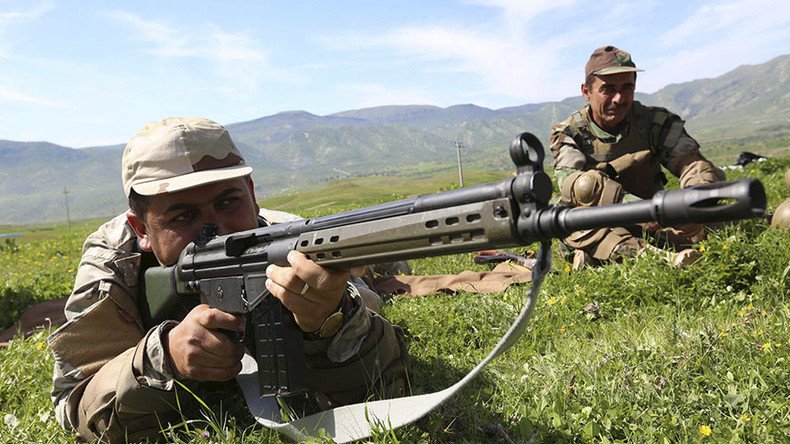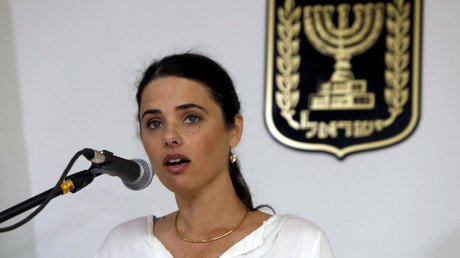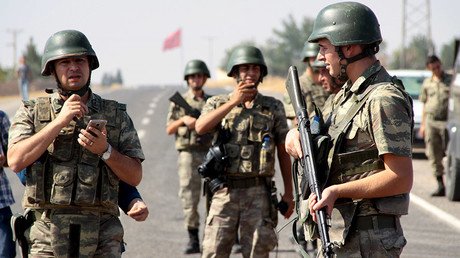‘Time has come’: Iraqi Kurd leader wants referendum to pave way for independence

The leader of Iraq's Autonomous Kurdistan Region has called for a referendum on independence, saying “the time has come” for Kurds to make a decision regarding their future, despite the threat posed by Islamic State and the dire economic situation.
The call was made by Massoud Barzani, leader of the Iraqi Kurdistan Region , who has been in power since 2005. However, he did not say when the proposed vote would take place.
"The time has come and the situation is now suitable for the Kurdish people to make a decision through a referendum on their fate," Barzani said in a statement released on Wednesday.
"That referendum does not mean proclaiming statehood, but rather to know the will and opinion of the Kurdish people about independence and for the Kurdish political leadership to execute the will of the people at the appropriate time and conditions."
To carry out the vote, the region would first need to establish an independent electoral authority, Barzani added.
The Iraqi Kurds have managed to gain large areas of territory, which they have been governing with autonomy by the Kurdistan Regional Government.
Despite the internal chaos in the region suffering severe economic problems due to the drop in the price of oil, Barzani believes there will never be a better chance for the Kurds to seize their chance of gaining independence.
"If the people of Kurdistan are waiting for someone else to present the right of self-determination as a gift, independence will never be obtained. That right exists and the people of Kurdistan must demand it and put it into motion," Barzani said, according to Reuters.
Previously, in July 2014, Barzani announced that plans to hold a referendum on independence later that year, saying that Iraq was already "effectively partitioned." However due to internal Iraqi political tensions and the advance of the Islamic State (IS, formerly ISIS/ISIL) the vote was put on hold.
The Iraqi Kurdish Peshmerga forces have been deployed in the frontlines and are actively fighting IS in Iraq. They have been providing boots on the ground to supplement the US-led coalition’s airstrikes against IS in Iraq.
Despite the goodwill they have gained in the international community, it is unlikely this will be enough for some world powers, including Washington, to support independence claims. The US has stated that it wants the Kurds to remain part of Iraq.
In December, Turkey carried out airstrikes targeting Kurdistan Workers' Party (PKK) forces in Kurdish-held areas in northern Iraq. PKK, one of the Kurdish militarized groups in the region, is considered to be a terrorist organization by Turkey and the US. Ten Turkish F-16 jets were involved in the raids with the Turkish General Staff saying that the targets were “destroyed in an aerial campaign.”
Tensions had already been rising between Ankara and Baghdad after Turkey deployed hundreds of troops equipped with tanks and artillery to Iraq’s northern Nineveh Governorate on December 4, saying they were there to train forces battling IS.
Baghdad said it had not asked for the help of Turkish forces, and demanded their withdrawal after it said Turkey had “illegally” sent the troops into Iraq. Describing the move as violation of sovereignty, the Iraqi government also asked NATO to intervene.
The Iraqi Kurds would seem to have at least one regional supporter, with Israel’s Justice Minister Ayelet Shaked speaking out in favor of an independent Kurdish state last month.
“We must openly call for the establishment of a Kurdish state that separates Iran from Turkey, one which will be friendly towards Israel,” Shaked told the annual INSS security conference in Tel Aviv on January 19, as cited by the Times of Israel.
Shaked sees the creation of a Kurdish state as an opportunity to weaken Israel’s rivals in the region.
“The Kurdish people are a partner for the Israeli people,” she mentioned, adding that Islamist extremism in the region is something both the Kurds and Israelis can work together on combatting. “We Kurds and Jews have a long history. We have common interests in trying to stop Daesh [Arabic slang term for IS] and the Kurds are fighting ISIS with all their might.”
Regional powers have historically opposed Kurdish aspirations for independence, especially neighboring states with large Kurdish minorities of their own.














